历年考研英语语法完全版归纳
- 格式:doc
- 大小:369.50 KB
- 文档页数:49
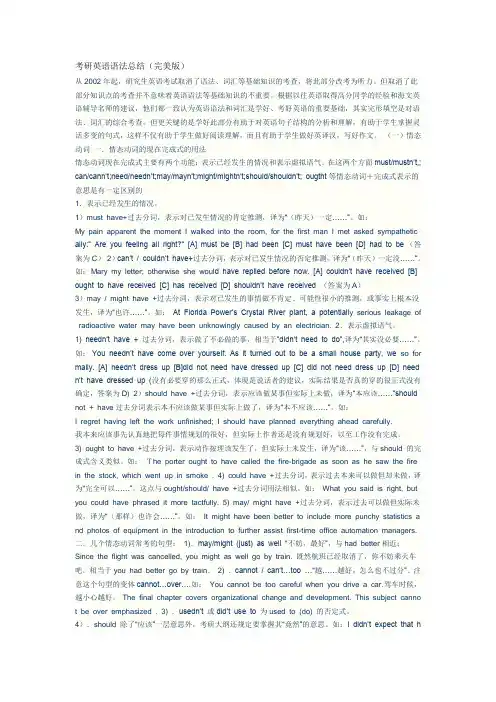
考研英语语法总结(完美版)从2002年起,研究生英语考试取消了语法、词汇等基础知识的考查,将此部分改考为听力。
但取消了此部分知识点的考查并不意味着英语语法等基础知识的不重要。
根据以往英语取得高分同学的经验和海文英语辅导名师的建议,他们都一致认为英语语法和词汇是学好、考好英语的重要基础,其实完形填空是对语法、词汇的综合考查,但更关键的是学好此部分有助于对英语句子结构的分析和理解,有助于学生掌握灵活多变的句式,这样不仅有助于学生做好阅读理解,而且有助于学生做好英译汉,写好作文。
(一)情态动词一.情态动词的现在完成式的用法情态动词现在完成式主要有两个功能:表示已经发生的情况和表示虚拟语气。
在这两个方面must/mustn’t,; can/cann’t;need/needn’t;may/mayn’t;might/mightn’t;should/shouldn’t; ougtht等情态动词+完成式表示的意思是有一定区别的1.表示已经发生的情况。
1)must have+过去分词,表示对已发生情况的肯定推测,译为“(昨天)一定……”。
如:My pain apparent the moment I walked into the room, for the first man I met asked sympathetic ally:” Are you feeling all right?” [A] must be [B] had been [C] must have been [D] had to be (答案为C)2)can’t / couldn’t have+过去分词,表示对已发生情况的否定推测,译为“(昨天)一定没……”。
如:Mary my letter; otherwise she woul d have replied before now. [A] couldn’t have received [B] ought to have received [C] has received [D] shouldn’t have received (答案为A)3)may / might have +过去分词,表示对已发生的事情做不肯定、可能性很小的推测,或事实上根本没发生,译为“也许……”。
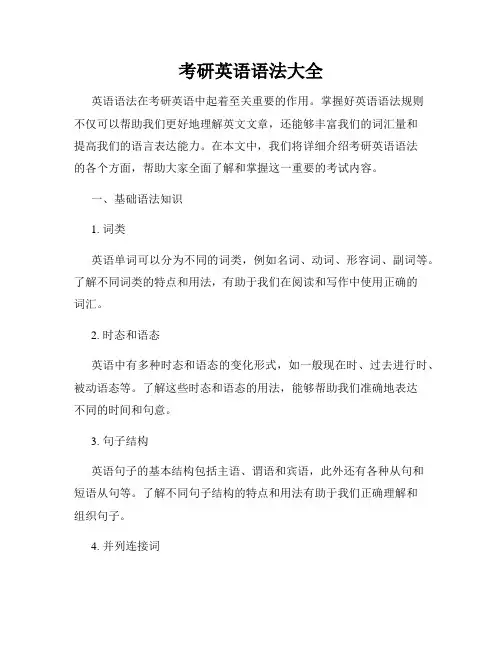
考研英语语法大全英语语法在考研英语中起着至关重要的作用。
掌握好英语语法规则不仅可以帮助我们更好地理解英文文章,还能够丰富我们的词汇量和提高我们的语言表达能力。
在本文中,我们将详细介绍考研英语语法的各个方面,帮助大家全面了解和掌握这一重要的考试内容。
一、基础语法知识1. 词类英语单词可以分为不同的词类,例如名词、动词、形容词、副词等。
了解不同词类的特点和用法,有助于我们在阅读和写作中使用正确的词汇。
2. 时态和语态英语中有多种时态和语态的变化形式,如一般现在时、过去进行时、被动语态等。
了解这些时态和语态的用法,能够帮助我们准确地表达不同的时间和句意。
3. 句子结构英语句子的基本结构包括主语、谓语和宾语,此外还有各种从句和短语从句等。
了解不同句子结构的特点和用法有助于我们正确理解和组织句子。
4. 并列连接词在英语句子中,我们经常使用一些并列连接词来连接两个或多个短语、从句或句子。
常用的并列连接词包括and、but、or等。
掌握并列连接词的使用方法可以帮助我们构思清晰、连贯的句子。
5. 介词和介词短语英语中的介词和介词短语在句子中起到连接和修饰的作用。
了解常用介词和介词短语的用法可以帮助我们正确表达时间、地点、方式等信息。
二、高级语法知识1. 同位语从句同位语从句是在名词后面起同位复合成分作用的从句,用来进一步解释、说明名词的具体内容。
了解同位语从句的结构和用法,可以帮助我们提升文章的逻辑性和丰富句子的结构。
2. 定语从句和非限制性定语从句定语从句是用来修饰名词的从句,常用的引导词有who、which、that等。
非限制性定语从句用来对先行词作补充说明,常用的引导词有which、who等。
了解定语从句和非限制性定语从句的用法,可以帮助我们提高写作的准确性和连贯性。
3. 条件状语从句条件状语从句用来表示条件、假设或前提等,常用的引导词有if、unless、whether等。
了解条件状语从句的用法,可以帮助我们在语言表达中准确、有逻辑地表达各种条件和假设。
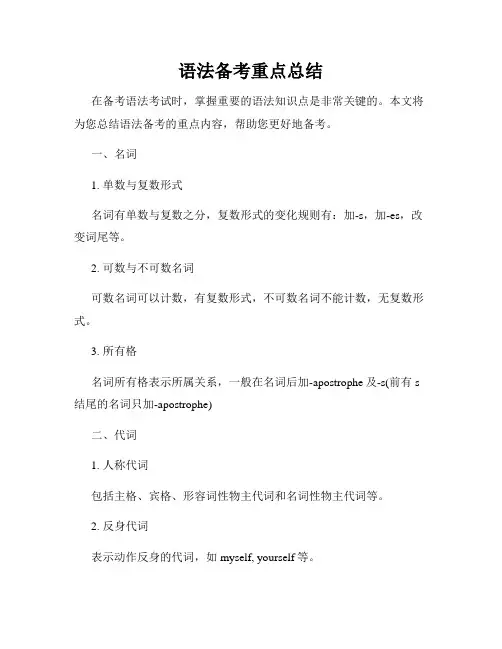
语法备考重点总结在备考语法考试时,掌握重要的语法知识点是非常关键的。
本文将为您总结语法备考的重点内容,帮助您更好地备考。
一、名词1. 单数与复数形式名词有单数与复数之分,复数形式的变化规则有:加-s,加-es,改变词尾等。
2. 可数与不可数名词可数名词可以计数,有复数形式,不可数名词不能计数,无复数形式。
3. 所有格名词所有格表示所属关系,一般在名词后加-apostrophe及-s(前有s 结尾的名词只加-apostrophe)二、代词1. 人称代词包括主格、宾格、形容词性物主代词和名词性物主代词等。
2. 反身代词表示动作反身的代词,如myself, yourself等。
3. 指示代词指示代词用于指示特定的人或物,如this, that, these, those等。
三、动词1. 时态英语动词的时态分为一般现在时、一般过去时、一般将来时等。
2. 语态英语动词的语态包括主动语态和被动语态。
3. 不定式和动名词不定式和动名词作为动词的另外两种形式,有着自己的用法和特点。
四、形容词与副词1. 形容词的比较级和最高级形容词的比较级和最高级分别表示两个或多个人或物之间的大小、高低等级别关系。
2. 副词的比较级和最高级副词的比较级和最高级用于修饰动词、形容词或其他副词,表示程度或者频率等。
五、介词介词用于表示人或事物之间的位置、方向、关系等,常常用来表示时间、地点、原因、目的等。
六、连词连词用于连接句子、词语等,起到组织语言的作用。
常见的连词有and, but, or, so, because等。
七、冠词冠词分为定冠词和不定冠词,用于限定名词的范围。
八、其他语法知识点1. 数词数词表示数目和顺序,包括基数词、序数词和分数词等。
2. 感叹词用来表示强烈的感情或感叹,如oh, wow, how等。
3. 词类转换常见的词类转换包括名词转动词、动词转名词、形容词转副词等。
以上是语法备考的重点总结,希望能对您的备考有所帮助。
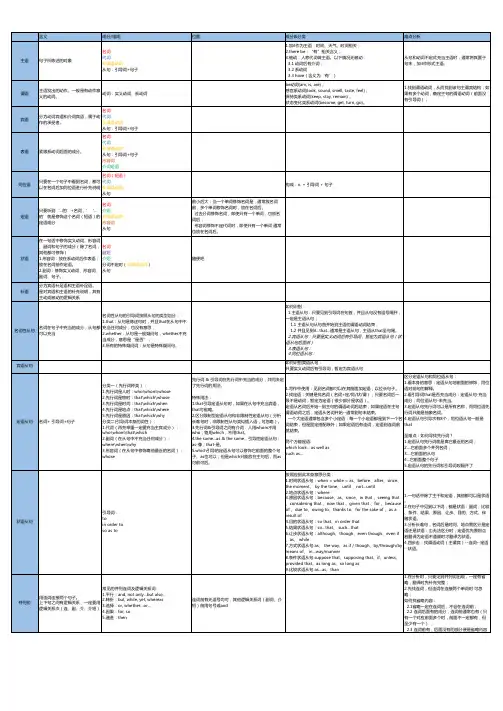
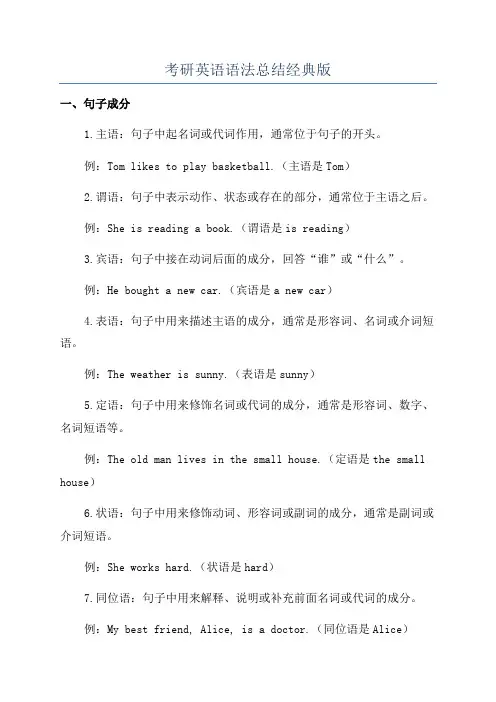
考研英语语法总结经典版一、句子成分1.主语:句子中起名词或代词作用,通常位于句子的开头。
例:Tom likes to play basketball.(主语是Tom)2.谓语:句子中表示动作、状态或存在的部分,通常位于主语之后。
例:She is reading a book.(谓语是is reading)3.宾语:句子中接在动词后面的成分,回答“谁”或“什么”。
例:He bought a new car.(宾语是a new car)4.表语:句子中用来描述主语的成分,通常是形容词、名词或介词短语。
例:The weather is sunny.(表语是sunny)5.定语:句子中用来修饰名词或代词的成分,通常是形容词、数字、名词短语等。
例:The old man lives in the small house.(定语是the small house)6.状语:句子中用来修饰动词、形容词或副词的成分,通常是副词或介词短语。
例:She works hard.(状语是hard)7.同位语:句子中用来解释、说明或补充前面名词或代词的成分。
例:My best friend, Alice, is a doctor.(同位语是Alice)二、时态和语态1.时态:表示动作发生的时间或状态的时间。
-现在时:表示现在正在进行的动作或状态。
例:I am reading a book.-过去时:表示过去发生的动作或状态。
例:He bought a new car.-将来时:表示将来要发生的动作或状态。
例:I will go to the beach tomorrow.-过去完成时:表示过去一些时间之前已经完成的动作或状态。
例:She had finished her homework before dinner.2.语态:表示动作的主体和受体。
-主动语态:表示主语执行动作或状态。
例:He cleans the room every day.-被动语态:表示主语承受动作或状态。
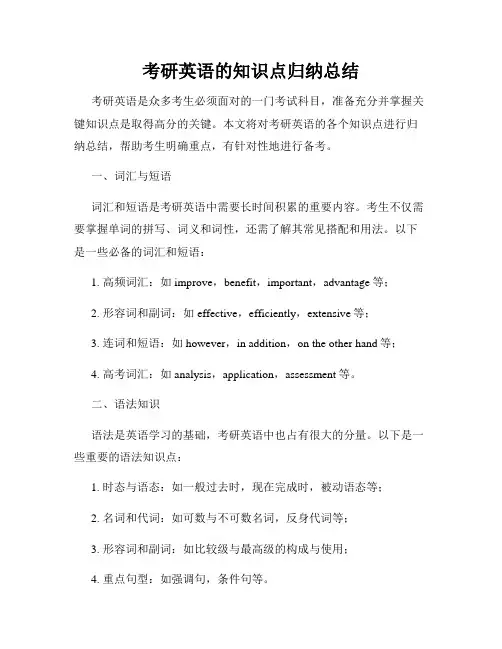
考研英语的知识点归纳总结考研英语是众多考生必须面对的一门考试科目,准备充分并掌握关键知识点是取得高分的关键。
本文将对考研英语的各个知识点进行归纳总结,帮助考生明确重点,有针对性地进行备考。
一、词汇与短语词汇和短语是考研英语中需要长时间积累的重要内容。
考生不仅需要掌握单词的拼写、词义和词性,还需了解其常见搭配和用法。
以下是一些必备的词汇和短语:1. 高频词汇:如improve,benefit,important,advantage等;2. 形容词和副词:如effective,efficiently,extensive等;3. 连词和短语:如however,in addition,on the other hand等;4. 高考词汇:如analysis,application,assessment等。
二、语法知识语法是英语学习的基础,考研英语中也占有很大的分量。
以下是一些重要的语法知识点:1. 时态与语态:如一般过去时,现在完成时,被动语态等;2. 名词和代词:如可数与不可数名词,反身代词等;3. 形容词和副词:如比较级与最高级的构成与使用;4. 重点句型:如强调句,条件句等。
三、阅读理解考研英语的阅读理解部分要求考生快速理解和分析文章,并回答问题。
以下是一些阅读理解的重要知识点:1. 主旨理解:通过理解文章的段落组织和推理,抓住文章的主旨;2. 词汇推理:通过上下文的暗示,推测生词的词义;3. 逻辑推理:通过推理和判断,找出文章中的事实、观点和结论。
四、写作技巧写作是考研英语中另一个需要重点关注的方面。
以下是一些写作技巧的总结:1. 理清思路:写作前要先明确中心思想,并按照逻辑次序组织文章;2. 合理使用句型:使用多样的句型可以提升文章的表达能力;3. 充实篇幅:通过添加合适的细节和例子来增加文章的充实度;4. 注意篇章结构:开头引入,中间论证,结尾总结。
五、听力技巧考研英语听力部分是很多考生的薄弱环节,下面是一些提高听力技巧的方法:1. 多听英文材料:多听英语新闻、音频书籍、电视剧等,提高对语音和语调的敏感度;2. 拓宽听力场景:听不同主题和语境的材料,增加对不同话题的理解能力;3. 注意听力关键词:将注意力集中在文章中的关键信息上,提高听力效果;4. 多做听力练习:通过模拟考试和听力练习来提高听力技巧。
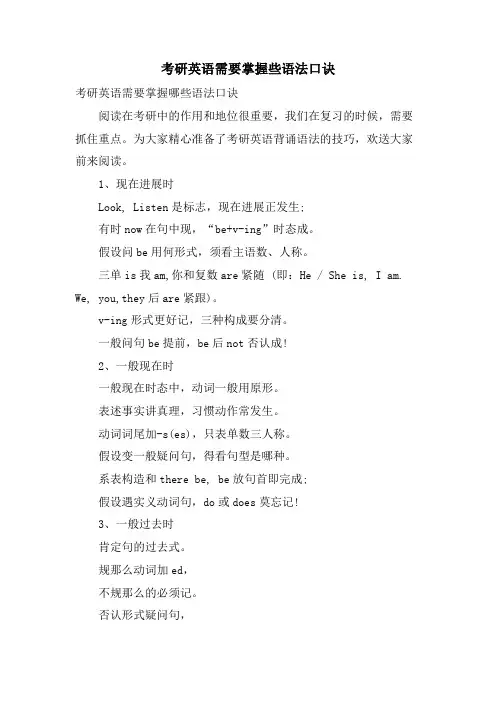
考研英语需要掌握些语法口诀考研英语需要掌握哪些语法口诀阅读在考研中的作用和地位很重要,我们在复习的时候,需要抓住重点。
为大家精心准备了考研英语背诵语法的技巧,欢送大家前来阅读。
1、现在进展时Look, Listen是标志,现在进展正发生;有时now在句中现,“be+v-ing”时态成。
假设问be用何形式,须看主语数、人称。
三单is我am,你和复数are紧随 (即:He / She is, I am. We, you,they后are紧跟)。
v-ing形式更好记,三种构成要分清。
一般问句be提前,be后not否认成!2、一般现在时一般现在时态中,动词一般用原形。
表述事实讲真理,习惯动作常发生。
动词词尾加-s(es),只表单数三人称。
假设变一般疑问句,得看句型是哪种。
系表构造和there be, be放句首即完成;假设遇实义动词句,do或does莫忘记!3、一般过去时肯定句的过去式。
规那么动词加ed,不规那么的必须记。
否认形式疑问句,没有be加did。
如把did加在前,动词还要归原形。
4、基数词变序数词基变序,很容易,一二三,特殊记,th从四起。
八去t来九去e,遇到ve,f替,ty变为tie,后加th莫迟疑,假设想表示几十几,只变个位就可以。
5、时间介词巧记歌年、月、季节前用in, (如:in xx, in September, in spring)日期前面行不通。
遇到几号或星期改用on来做代替, (如:on January 1,onWedesday)上午、下午、晚上仍用in。
(如:in themorning/afternoon/evening)假设是某日上下午,也是用on才能行。
(如:on theevening of the Mid-autumn Day)正午、夜里用at, (如:at noon, at night)时、分用法也同理。
(如:, at two, at two)如假设“差”点须加to, (如:two to two)如假设“过”点改past。
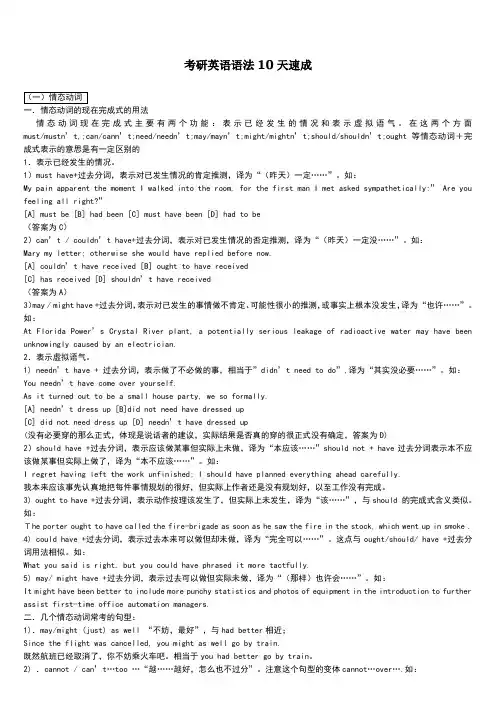
考研英语语法10天速成一.情态动词的现在完成式的用法情态动词现在完成式主要有两个功能:表示已经发生的情况和表示虚拟语气。
在这两个方面must/mustn’t,;can/cann’t;need/needn’t;may/mayn’t;might/mightn’t;should/shouldn’t;ought等情态动词+完成式表示的意思是有一定区别的1.表示已经发生的情况。
1)must have+过去分词,表示对已发生情况的肯定推测,译为“(昨天)一定……”。
如:My pain apparent the moment I walked into the room, for the first man I met asked sympathetically:” Are you feeling all right?”[A] must be [B] had been [C] must have been [D] had to be(答案为C)2)can’t / couldn’t have+过去分词,表示对已发生情况的否定推测,译为“(昨天)一定没……”。
如:Mary my letter; otherwise she would have replied before now.[A] couldn’t have received [B] ought to have received[C] has received [D] shouldn’t have received(答案为A)3)may / might have +过去分词,表示对已发生的事情做不肯定、可能性很小的推测,或事实上根本没发生,译为“也许……”。
如:At Florida Power’s Crystal River plant, a potentially serious leakage of radioactive water may have been unknowingly caused by an electrician.2.表示虚拟语气。

考研英语基础语法汇总一、非谓语动词( V+ing, V+ed)1, 动名词(1)作主语和宾语Saying is easier than doing.说比做容易。
(2)作介词宾语We get pleasure from loving and being loved.我们从爱别人和被别人爱中得到快乐。
2,分词作定语(1)前置The beginning student should be given more encouragement.初学者应多给予鼓励。
A balanced diet provides nutrition for your body.均衡的食物使你的身体获得营养。
(2)后置Those living on a mountain live off the mountain.靠山吃山Children disciplined when they are young will become good citizen.小时候受过良好教育的儿童长大会成为好公民。
3,分词作状语Hearing the news, they immediately set off for Shanghai.听到这个消息,他们立即出发到上海去了。
Seen from the pagoda, the south foot of the Purple Mountain is a sea of trees.从这个塔上远眺,紫金山南麓是树的海洋。
Printed white, the house looks bigger.漆成白色后,这房子像是更大了。
Having written an important letter, I litsened to the music for a while.写完一封重要的信之后,我听了一会儿音乐。
Arguing from the view that humans are different from animals in every relevant respect, extremists of this kind think that animals lie outside the area of moral choice.持极端观点的人认为,人与动物在各相关方面都不相同,所以对待动物无须考虑道德问题。
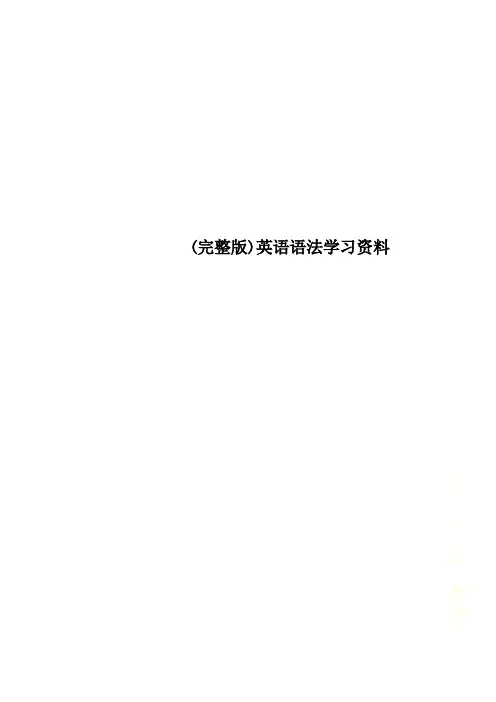
(完整版)英语语法学习资料英语语法学习资料(完整版) 第一讲名词⏹1.1名词的分类⏹名词可以分为专有名词(Proper Nouns)和普通名词 (Common Nouns),专有名词是某个(些)人,地方,机构等专有的名称,如Beijing,China等。
普通名词是一类人或东西或是一个抽象概念的名词,如:book,sadness等。
普通名词又可分为下面四类:1)个体名词(Individual Nouns):表示某类人或东西中的个体,如:gun。
2)集体名词(Collective Nouns):表示若干个个体组成的集合体,如:family。
3)物质名词(Material Nouns):表示无法分为个体的实物,如:air。
4)抽象名词(Abstract Nouns):表示动作、状态、品质、感情等抽象概念,如:work。
个体名词和集体名词可以用数目来计算,称为可数名词(Countable Nouns),物质名词和抽象名词一般无法用数目计算,称为不可数名词(Uncountable Nouns)。
归纳表格如下⏹ | |专有名词 | || 名 | | 个体名词 | | | | |------------| 可数名词|| | | 集体名词 | | | |普通名词 | | | | 词 | | 物质名词 | | | | |------------| 不可数名词|| | | 抽象名词 | |) 以y 1结尾的专有名词,或元音字母+y 结尾的名词变复数时,直接加s变复数:如:two Marys the Henrys monkey---monkeys holiday---holidays 比较:层楼:storey ---storeys story---stories2) 以o 结尾的名词,变复数时:a. 加s,如:photo---photos piano---pianosradio---radios zoo---zoos;b. 加es,如:potato--potatoes tomato--tomatoesc. 均可,如:zero---zeros / zeroes3) 以f或fe 结尾的名词变复数时:a. 加s,如:belief---beliefs roof---roofssafe---safes gulf---gulfs;b. 去f,fe 加ves,如:half---halvesknife---knives leaf---leaves wolf---wolveswife---wives life---lives thief---thieves;c. 均可,如:handkerchief:handkerchiefs / handkerchieves名词复数的不规则变化1)child---children foot---feet tooth---teethmouse---mice man---men woman---women注意:与 man 和 woman构成的合成词,其复数形式也是 -men 和-women。
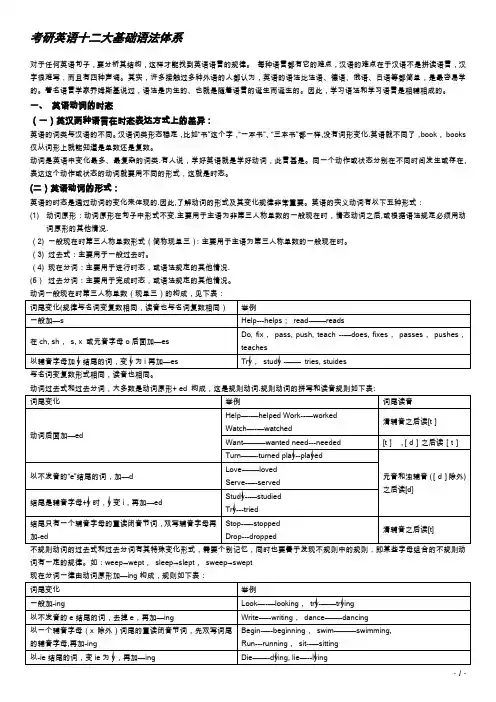
考研英语十二大基础语法体系对于任何英语句子,要分析其结构,这样才能找到英语语言的规律。
每种语言都有它的难点,汉语的难点在于汉语不是拼读语言,汉字很难写,而且有四种声调。
其实,许多接触过多种外语的人都认为,英语的语法比法语、德语、俄语、日语等都简单,是最容易学的。
著名语言学家乔姆斯基说过,语法是内生的、也就是随着语言的诞生而诞生的。
因此,学习语法和学习语言是相辅相成的。
一、英语动词的时态(一)英汉两种语言在时态表达方式上的差异:英语的词类与汉语的不同。
汉语词类形态稳定,比如“书”这个字,“一本书”、“三本书”都一样,没有词形变化.英语就不同了,book,books 仅从词形上就能知道是单数还是复数。
动词是英语中变化最多、最复杂的词类.有人说,学好英语就是学好动词,此言甚是。
同一个动作或状态分别在不同时间发生或存在,表达这个动作或状态的动词就要用不同的形式,这就是时态。
(二)英语动词的形式:英语的时态是通过动词的变化来体现的.因此,了解动词的形式及其变化规律非常重要。
英语的实义动词有以下五种形式:(1)动词原形:动词原形在句子中形式不变.主要用于主语为非第三人称单数的一般现在时,情态动词之后,或根据语法规定必须用动词原形的其他情况.(2) 一般现在时第三人称单数形式(简称现单三):主要用于主语为第三人称单数的一般现在时。
(3) 过去式:主要用于一般过去时。
(4) 现在分词:主要用于进行时态,或语法规定的其他情况.(5)过去分词:主要用于完成时态,或语法规定的其他情况。
与名词变复数形式相同,读音也相同。
动词过去式和过去分词,大多数是动词原形+ ed 构成,这是规则动词.规则动词的拼写和读音规则如下表:不规则动词的过去式和过去分词有其特殊变化形式,需要个别记忆,同时也要善于发现不规则中的规则,即某些字母组合的不规则动词有一定的规律。
如:weep→wept,sleep→slept,sweep→swept为了学习的方便,人们把时间分为四个阶段:“现在、过去、将来、过去将来”。
考研英语语法必考的知识点有哪些考研英语语法的重点知识第一、虚拟语气.第二、动词的时态.第三、动词的非谓语形式.第四、倒装,倒装在翻译里面考的多,一般一个英文的句序加入它是倒装的,你必须把它译成主动的,否则的话扣0.5分。
第五、强调,强调在哪儿考的多啊,在阅读理解里面,你一旦发现有强调的句式你就把后面的东西圈起来,都是出题的陷阱。
第六、主谓一致,主谓一致在完型天空中考的最多.第七、省略,省略在翻译里面考的最多,因为一个句子,它把它省略出来了,那么你在翻译的时候要把被省略的内容翻译出来,否则扣1分,记住了,这就是规则。
第八、从句,包括定语从句,状语从句,都在内。
第九、THERE BE 句型,简单。
考研英语翻译实用的复习方法▶重译法在翻译中,有时为了忠实于原文,不得不重复某些词语,否则就不能忠实表达原文的意思。
重译法有如下三大作用:一是为了明确;二是为了强调;三是为了生动。
We have advocated the principle of peaceful coexistence, which is now growing more and more popular among the nations of Asia and Africa.译文:___________________________________________________▶增译法为了使译文忠实地表达原文的意思与风格并使译文合乎表达习惯,必须增加一些词语。
A new kind aircraft-small, cheap, pilotless -is attracting increasing attention.译文:___________________________________________________▶减译法和其他一切事物一样,翻译也是有增必有减。
理解了增译法之后也就明白了减译法,它是增译法的反面。
These developing countries cover vast territories, encompass a large population and abound in natural resources.译文:___________________________________________________▶词类转译法在翻译时,由于两种语言在语法和习惯表达上的差异,在保证原文意思不变的情况下,译文必须改变词类,这就是词类转译法,这种方法不仅指词类的改变,而且还包括词类作用的改变和一定词序的变化。
考研英语语法大全冠词(article)一、单数可数名词单数可数名词前必须加冠词,a(an)表示泛指或类指,the表示特指或类指。
例句: washington, who had begun to believe that all men were created equal after observing the bravery of the black soldiers during the revolutionary war, overcame the strong opposition of his relatives to grant his slaves their freedom in his will. (选自xx年text 4)分析:该句是复合句,其中主句是washington overcame the strong opposition...,who引导的非限制性定语从句修饰washington,该句中又有一个that引导的从句作believe的宾语。
译文:在美国独立战争期间目睹了黑人士兵的勇敢之后,华盛顿才开始认为人生来平等。
他克服了亲人的强烈反对,在遗嘱中给自己的奴隶们自由。
例句: while the quality of legal journalism varies greatly, there is an undue reliance amongst many journalists on interpretations supplied to them by lawyers. (选自xx年part c)分析:该句是复合句,其中supplied to them by lawyers作定语修饰interpretations,undue reliance意为“过分依赖”。
译文:虽然法律报道的质量各不相同,但是许多新闻记者都过分依赖律师提供给他们的解释。
二、定冠词the的用法在下述几种情况下须用定冠词the:表示世界上独一无二的名词,用在可数名词单数或某些形容词前代表一类人或事物,用在形容词、副词最高级和序数词和only之前。
考研英语十二大基础语法体系一、英语动词的时态英语动词的形式:英语的时态是通过动词的变化来体现的。
因此,了解动词的形式及其变化规律非常重要。
英语的实义动词有以下五种形式:(1)动词原形:动词原形在句子中形式不变。
主要用于主语为非第三人称单数的一般现在时,情态动词之后,或根据语法规定必须用动词原形的其他情况。
(2) 一般现在时第三人称单数形式(简称现单三):主要用于主语为第三人称单数的一般现在时。
(3) 过去式:主要用于一般过去时。
(4) 现在分词:主要用于进行时态,或语法规定的其他情况。
(5) 过去分词:主要用于完成时态,或语法规定的其他情况。
动词一般现在时第三人称单数(现单三)的构成:一般加-s,在ch, sh, s, x 或元音字母o后面加-es,以辅音字母加y结尾的词,变y为i再加-es动词过去式和过去分词,大多数是动词原形+ ed 构成,这是规则动词。
不规则动词的过去式和过去分词有其特殊变化形式,需要个别记忆。
现在分词一律由动词原形加-ing构成:一般加-ing,以不发音的e结尾的词,去掉e,再加-ing,以一个辅音字母(x除外)词尾的重读闭音节词,先双写词尾的辅音字母,再加-ing,以-ie结尾的词,变ie为y,再加-ing。
把时间分为四个阶段:“现在、过去、将来、过去将来”。
英语动词所表示的动作在以上每个时间段中分别有四种状态:一般、进行、完成和完成进行。
因此我们便有了四四一十六个时态。
“时态”就是通过动词的形态变化,来表达动作发生的时间(现在、过去、将来、过去将来)及所处的状态(一般、进行、完成、完成进行)。
比如在“They are doing their exercises.”这个句子中,动词由原形do 变成are doing 的形态,说明这个事情是发生在现在、并处于正在进行的状态当中,所以叫现在进行时;在“They have done their exercises.”这句中,动词由原形do 变成have done的形态,说明这个事情是发生在现在、并处于完成的状态,所以叫现在完成时;在“They always do their exercises.”中,动词用原形do 的形态,说明这个事情是发生在现在、并且是一般情况下永远如此,所以叫一般现在时。
英语语法大全知识点总结英语语法是学习英语的重要组成部分,掌握好语法知识对于提高英语水平至关重要。
下面将对英语语法的一些重要知识点进行总结,希望对大家的学习有所帮助。
1. 时态英语中共有12种时态,包括一般现在时、一般过去时、一般将来时、现在进行时、过去进行时、将来进行时、过去将来时、过去完成时、现在完成时、将来完成时、现在完成进行时、过去完成进行时。
时态的正确使用对于表达时间关系非常重要。
2. 语态英语中的语态有主动语态和被动语态。
主动语态是指主语是动作的执行者,而被动语态是指主语是动作的承受者。
被动语态的构成是由助动词be + 过去分词构成的。
3. 语气英语中的语气有陈述语气、疑问语气、祈使语气和感叹语气。
不同语气的使用会直接影响语句的表达方式和语义。
4. 名词英语名词分为普通名词、专有名词、抽象名词和集体名词。
名词的单数、复数形式、所有格、不可数名词的用法都是需要掌握的重要知识点。
5. 代词代词包括人称代词、物主代词、反身代词、指示代词、相互代词、疑问代词、不定代词等。
代词的使用要根据语境和语法要求来正确选择。
6. 形容词和副词形容词和副词是修饰名词和动词的词语,形容词主要用来修饰名词,副词主要用来修饰动词、形容词或其他副词。
比较级和最高级的构成、不规则比较级和最高级、形容词和副词的用法都是需要注意的知识点。
7. 冠词英语的冠词有定冠词和不定冠词,定冠词包括定冠词“the”和零冠词,不定冠词包括不定冠词“a”和“an”。
冠词的使用要符合语法规则和语境要求。
8. 介词介词是连接词和词组的词语,主要用来表示词语之间的关系,包括地点、时间、方式、原因、目的、关系等。
介词的正确使用对语句的表达和语义有重要影响。
9. 连词英语的连词包括并列连词、从属连词和关联词。
并列连词用来连接词、词组和句子,从属连词用来引导从句,关联词用来连接词语和词句的词语。
连词的正确使用对语句的逻辑和语义都有重要影响。
总的来说,英语语法是英语学习的基础,只有掌握了语法知识,才能更好地理解和运用英语语言。
考研英语语法(动词)详细解析总结(含例句)●一. 动词的分类后续语法内容的基础,同学们只需要了解清楚这些概念、能够明白区分,在后续长难句分析时对这些说法不陌生即可,不然遇到完形填空和翻译会一头雾水哦1.可作谓语动词:句子的核心句子成分中的谓语●实义动词:也叫做行为动词,因为这些动词都拥有实际的意义在考研英语中大部分的遇到的其实只需要区分及物和不及物动词,通常会在完形填空的选项和翻译中进行考察,但还是希望同学们能够认真学习理解,为自己的英语长难句打下坚实的基础●按照是否需要动作的承受者划分●及物动词:需要带个人或者物品在动词后面,就是说动作是有对象的,即宾语eg. read a book 读一本书●不及物动词:可以独立完成的动作,即动作没有对象eg. A cat sleeps. 一只猫睡觉●按照状态动作划分●动作动词:可以动起来的动作eg. eat 吃●状态动词:相对静止,表示一种状态eg. have 有;feel 感觉;own 拥有●系动词:也叫做连系动词,连系主语和表语●非常好理解,就是“赋值”的意思,把系动词后面的含义赋予给它之前的部分●am;is;are●eg. I am a girl. 我是一个女孩 (am的作用就是把女孩这个信息赋予给我)●keep;stay;seem;appear;feel;become;turn...●eg. The sky grew dark. 天空渐渐变暗(就是把暗这个信息赋值给天空)2.可辅助构成谓语动词:助动词不能独立做句子的谓语●概念●句子中的谓语动词本身有时候无法独立表达某些语法概念,需要其他词的辅助来表达;而这类辅助词自己本身不能做谓语动词●eg. The student will read a book. 这个学生将看书【如果我们想要表达将来时态,但动词本身并不能表达将来的意思,所以久必须在前面加上will来“辅助”完成表达;will就是构成将来时的助动词,并且will本身不能做谓语动词】●特征(判断)●(是否)辅助主动词构成语法概念●(是否)不能单独作谓语动词●分类●基本助动词:be;do;have作为助动词时,他们本身没有什么任何实际含义,但是要注意他们也可以作实义动词:be 存在;do做;have有●eg. The student is reading a book. 学生正在看书(辅助构成现在进行时)●eg. The student has read a book. 学生已经看过书了(辅助构成现在完成时)●eg. I do like you!我真的喜欢你(辅助构成强调句)●情态(助)动词注意:前三组后面的词是前面的过去式●can/couldcould在虚拟语气中更多使用●表能力(做…);会…;可以…●eg. I can read a book. 我可以看书(有能力)●eg. Can/Could I borrow your money?我可以找你借钱吗?(表请求或许可)●eg. Anything can happen. 什么事都可能发生(可能性)●may/might●表达请求,同上●或许;也许,表可能性,可能性程度小于can/could●表祝愿 eg. May you succeed!祝你成功!●shall/should●shall●构成将来时,同will●表推测、征求意见 eg. Shall we meet tomorrow?我们明天见怎么样?●表警告、命令 eg. You shall not pass!你不能通过!●should●表应当 eg. You should study now!你现在应该去学习!●表有一定根据的推测 eg. It should rain tomorrow. 明天应该会下雨(有天气预报一定的根据性)●构成虚拟语气(后续学习)●will/would●构成将来时(后续时态学习)●表请求、建议 eg. Will you lend my money?你愿意借我钱吗?●表推测、假设 eg. Ask him,he will/would know. 问他吧,他可能知道●must●表必须 eg. You must finish your homework!你必须做完作业!●表禁止 eg. You must not(mustn't)smoke here. 这里禁止吸烟注意:must not不是“不必须”的意思,而且“必须不”!●表肯定 eg. You must be hungry.(干饭时间到了)你肯定饿了吧●ought to 同should:应该●dare/dared 敢 eg. How dare you!你好大的胆子!●need●实义动词:需要 eg. I need you!我需要你!●情态动词:需要;有必要 eg. You don't need to study. 你不需要学习【相当于must表不需要的否定】●used to●表过去经常的事情,强调与现在的对比●eg. I used to eat apples,now I only eat bananas. 我过去经常吃苹果,但我现在只吃香蕉●半助动词:既像主动词又像助动词●be able to 表能力同can/could●表将要做,同will●be going to●be about to●had better3.不可作谓语动词:非谓语动词(非限定性动词)一个简单句中只能有一个谓语动词,所以其他动词只能以非谓语动词的形式出现●概念●不受主语限制、不被限定的动词,不具有表达时间和人称的作用(与谓语动词相反)●eg. I like to study. 我喜欢学习(like就是句子的谓语动词,受主语限制:helikes;而to study则不受主语限制)●不定式:to do(to + 动词原形)●充当句子主语 To eat an apple everyday is good for health. 一天吃一个苹果对健康有好处(to eat 不定式不受具体的人和时间限制)= It is good for health toeat an apple everyday. (虽然it做了形式主语,单核心还是to eat 不定式)●作后置定语 I have many books to read. 我有很多书要看(to read做后置定语来修饰books:我有很多书,什么样子的书呢?需要阅读的书)●作状语●表原因 I am surpised to get a thumbs-up. 我很惊讶(因为)得到一个赞= I am surpised because I get a thumbs-up.●表目的 I study to pass exams. 我复习为了考试顺利= I study in order that I can pass exams.●高级不定式:与后续时态结合●动名词:doing(动词原形+ing)●从名字也可以知道,就是把动词转化为名词性质使用,本质相当于名词●eg. Seeing is believing. 眼见为实(seeing作主语;believing作表语)●现在分词:doing(动词原形+ing)●本质相当于形容词,起修饰作用【表主动关系:描述做动作的人/物】●eg. The book is interesting. 这本书很有趣(书主动令人感到很有趣)●过去分词:done(一般动词原形 + ed,不规则动词需要积累记忆)●本质相当于形容词,起修饰作用【表被动关系:描述动作的接收者】●eg. I am interested in the book. 我对这本书感兴趣(我被这本书引起了兴趣)●二. 动词的时态动作的时间+动作的状态1.前言●英语的十六大时态●4种时间与4种状态排列组合就是英语语法的16种时态,但是时态体系过于庞大复杂,许多时态也非常少见,我们只需要学习常见的时态即可●时间:现在;过去;将来;过去将来【对于过去某一个时间点的将来,eg.昨天是前天的将来】●状态:一般;进行;完成;完成进行【动作完成了一部分,仍在进行】●为什么大家之前学习英语时态觉得是一团乱麻呢●难点1:时间&状态搅在一起在学校学习时态时,总是遇到一个时态学习一种时态,通常就是一会学过去完成时一会又是学一般现在时,没有清晰地认知时间和状态组合的方式,脑子里的时态杂糅在一起,让大家觉得时态很复杂很难●难点2:动词的变位在中文表达里,对于一个动作的完成和进行描述地非常简洁,例如:我正在吃饭;我吃饭了但是在英语里,则需要大家记动词的不同形式,eg.eat~ate~eaten 原型~过去式~过去分词●难点3:助动词英语时态的表达通常还需要助动词进行辅助,并且助动词会随着时态有不同的变形,例如助动词have,在现在完成时使用是have(has),而在过去完成时里使用是had2.1一般现在时●概念理解●动作发生在“现在”的时间段内经常发生的动作或者存在的状态●1. 表达事实没有状态限制,也没有时间限制●陈述一些事实、具有真理性的内容●eg. The sun rises in the east. 太阳从东边升起●eg. You love to learn. 你热爱学习●2. 表达习惯性、规律性、重复的动作●eg. I read books. 我阅读(我的习惯)(每天都发生的事情)●eg. You get up at 7 o'clock everyday. 你每天七点钟起床●3. 表达预计发生的事(客观的事实)●eg. The bus leaves at 6 PM tonight. 公交车今晚六点离站●形式用法●第一人称/第二人称/名词复数 + 动词原形●eg. We usually go to school at 7:30. 我们通常七点半去上学●eg. My parents work five days a week. 我的父母一周工作五天●第三人称单数(单三)+ 动词原型 + s注意:有些动词的单三形式有特殊变形,+s是普遍情况●eg. He likes to swim. 他喜欢游泳●eg. She goes shopping every weekend. 她每周末都去逛街3.2现在进行时●概念理解●动作发生在“现在”动作正在进行中,相当于中文中的“正在做某事”●形式用法●助动词be的变位(am/is/are)+ 动词的现在分词(动词原形 + ing)注意:有些动词的特殊变位需要大家积累记忆;例如:write去e+ing、get双写t+ing●eg. You are reading a book. 你正在看书●eg. I am writing papers. 我正在写论文●eg. She/He is doing homework. 她/他正在做作业4.3现在完成时●概念理解●1. 表示强调动作的影响或是结果●动作发生在“过去”并且已经完成这个动作对现在仍存在影响,强调对现在的影响●eg. I have lost my pen. 我的钢笔丢了(结果:我现在没有钢笔用)●eg. He has finished his work. 他的工作已经完成了(结果:他可以去休息了)●2. 表示动作的持续●动作从“过去”开始发生但还没有结束一直持续到现在,也可能还会持续下去●eg. You have been in school for 22 years. 你已经上学22年了(你从过去开始上学,持续到现在,已经持续22年了,你还可能继续持续下去)●eg. He has been busy since last week. 他从上周开始就一直很忙(持续到现在也很忙)●形式用法●助动词have的变位(have/has) + 动词的过去分词(通常动词原形 + ed)注意:有些动词的特殊变位需要大家积累记忆;例如:do~did~done●eg. I have been Wuhan before. 我之前去过武汉●eg. She hasn't finished her work yet. 她还没有完成工作5.4现在完成进行时●概念理解●动作从“过去”开始发生一直持续到现在,并且还会持续下去●可以理解为现在完成时和现在进行时的合体,强调动作的持续性●形式用法●助动词have的变位(have/has)+ been + 动词的现在分词●eg. The rabbit has been eating carrots. 兔子一直在吃胡萝卜(兔子已经吃了一段时间,还将继续吃下去)●eg. I have been watchinig this movie. 我在看这一部电影(我到现在为止已经看了一段时间了,我还要继续再看一段时间)6.5一般过去时●概念理解●就是一般现在时往前推了一个时间,动作发生在“过去”的时间动作发生了●形式用法●各人称 + 动词过去式(通常是动词原形 + ed)注意:不要与过去分词混淆,特殊动词需要记忆,例如:go~went;take~took●eg. I/We/You/He/She/It/They/The rabbit ate a carrot. 我/我们/你(们)/他/她/它/他们/这只兔子吃了一根胡萝卜7.6过去进行时●概念理解●动作发生在“过去”的某个时间段动作是当时进行中的●形式用法●助动词be的变位(was/were)+ 动词的现在分词(动词原形 + ing)●eg. I/He/She/It/The rabbit was eating a rabbit. 我/他/她/它//这只兔子吃了一根胡萝卜(在过去的某个时间点正在吃胡萝卜的过程)●eg. You/We/They were reading books. 你(们)/我们/他们处于过去的某个时间点正在看书的过程8.7️过去完成时●概念理解●就是现在完成时态往前推一个时间段,动作发生在“过去”并结束相对于过去的某一个时间造成了影响●形式用法●助动词have的变位(had) + 动词的过去分词(通常动词原形 + ed)●eg. I had eaten 5 carrots for lunch yesterday,so I wasn't hungry last night. 我昨天午饭吃了五根胡萝卜,所以我昨晚不饿(昨天中午发生的动作对昨天晚上造成了影响:我不饿)●eg. He tried to find me yesterday afternoon,but I had already gone to Wuhan. 他昨天本来想找我,但是我已经去武汉了(我可能昨天早上、前天——比昨天下午早的时间去武汉了,对昨天下午造成了影响:他没有找到我)9.8️一般将来时●概念理解●表示动作发生在“将来”的某一时间点动作将会发生(说话者十分肯定)●形式用法●各人称 + will + 动词原形这是最常见的将来时表达方式●eg. I/We/You/He/She/It/They/The rabbit will eat a carrot. 我/我们/你(们)/他/她/它/他们/这只兔子将要吃一根胡萝卜10.9️将来进行时●概念理解●就是现在进行时往后推了一个时间段,动作发生在“将来”的某个时间段动作是在当时进行的过程中●形式用法●will + 助动词be + 动词的现在分词(动词原形 + ing)●eg. I/We/You/He/She/It/They/The rabbit will be eating a carrot for dinnertomorrow. 我/我们/你(们)/他/她/它/他们/这只兔子明天晚餐将会在吃一根胡萝卜(明天晚餐这个时间会处于吃胡萝卜这个动作的过程中)11.将来完成时●概念理解●就是现在完成时态往后推一个时间段,动作发生在“将来”并结束相对于未来的某一个时间造成了影响●形式用法●will + 助动词have + 动词的过去分词(通常动词原形 + ed)●eg. I will have finished doing my homework by 4 PM tomorrow,so I can goshopping after that. 我将在明天下午四点前写完作业,那样我之后就可以去逛街了(对于明天下午四点钟这个时间点完成作业将会对明天晚上造成影响:我可以出去逛街)●三. 动词的语气1.陈述语气:描述事实(句号结尾)●前面时态中的所有例句均是陈述语气2.祈使语气:命令/请求(通常会以感叹号结尾)●一般会使用第二人称“你” + 一般现在时●去掉“你”,保持动词原形●eg. Go to school!(you go to school!)●eg. Never give up!(you never give up!)●eg. Don‘t do th at!(you don’t do that!)3.虚拟语气:与现实相反的●其实虚拟语气在中文中也常常有表达,只是英语的难点在于动词需要变位●表“不可能”的假设●【与现在事实相反】描述主观意愿,或者想象的假设●条件句:(if)过去式;主句:would + 动词原形●eg. If I knew that,I would tell you. 如果我知道我就会告诉你了(这里说的就是其实过去,在当时我并不知道)●eg. If I were you, I would study hard. 如果我是你,我会努力学习(但我不可能是你,描述了我的主观意愿假设)注意:虚拟语气中be动词的过去式不论人称,均是were●【与将来事实相反】描述可能性很小的事情●条件句:should (在这里是shall的过去式,不是“应该”)+ 动词原形;主句:would + 动词原形●eg. If I should meet you after long years,how would I greet you?如果多年以后再见到你,我又该如何面对你?(言下之意就是说我俩相逢遥遥无期,不怎么可能会重逢)●【与过去事实相反】描述与过去已经发生的事情相反,不可能的事情●条件句:had + 动词过去分词;主句:would have + 动词过去分词●eg. If I had learned grammer before,I would have passed my exam. 我要是之前就学过语法,我肯定上岸了(说明我过去并没有学过语法,多半可能就是我没上岸)●表达愿望、请求、建议等,就是“希望某个事情能发生”(常常是发生在我们的脑海中的)●对现在的愿望●wish + 动词过去式●eg. I wish that I were a boy. 我希望我是男孩(我希望我现在能是个男孩子)●对过去的愿望●wish + had/would have + 动词过去分词●eg. I wish I had eaten that carrot. 我希望我吃了那个胡萝卜(后悔啊我当时没吃)●对未来的愿望●wish + should/would/could/might + 动词原形●eg. I wish I could eat that carrot. 我希望我能吃那个胡萝卜(伤心啊我可能根本吃不到的)●表达愿望、请求、建议等。
英语语法总结全集名词和主谓一致一、名词的分类英语中名词主要可以分为可数名词和不可数名词。
1.可数名词可数名词一般都有单复数。
单数时,名词前可加不定冠词a/an;复数时,前面可加数词,名词本身要改成复数形式。
可数名词的复数有规则和不规则两种变化。
规则的名词,只要在单数名词之后加“s”,“es”或去“y”加“ies”就行,如:an umbrella, twelve umbrellas;a factory, three factories。
不规则的名词变化则要靠积累记忆,如:a mouse, ten mice;a policeman, six policemen。
有少数可数名词,如sheep,works(工厂),Chinese等,它们的单复数同形:a sheep, four sheep;a chemical works, five chemical works。
此外,还有一些可数名词只有复数形式,如clothes,trousers,cattle,police,people(人,人民)等。
英语名词中还有一些合成词,它们的复数形式有三种可能:1)后面的部分变成复数形式:grown-ups,boy students,grandchildren。
2)前面的部分变成复数形式:passers-by,lookers-on,sons-in-law。
3)前、后都变成复数形式:men doctors,women drivers。
2.不可数名词不可数名词没有单复数的变化,前面也不能加a/an,或数词。
但是我们可以用量词来表示不可数名词的数量,单复数表现在量词上,如:a piece of paper;two pieces of paper。
在有些情况下,不可数名词也可用a/an,表“一种”、“某种”的意思,如have a wonderful time,receive a good education,be made into a fine paper。
有时为了表示量大,不可数名词的后面也可加“s”,如sands,ashes,waters等。
但是我们在学习不可数名词的时候,特别要记住英语中有一些名词,它们无论在什么情况下,前面都不能用a/an,后面也不可加“s”,如weather,information,等。
3.有的名词既可是可数名词,也可是不可数名词英语中有相当一部分的名词,既可以是可数,也可以是不可数,它们的意义有时略有不同,有时则完全不同。
如:difficulty, success, time, work,paper,glass,等。
4.用于表示可数与不可数名词的数量“多”“少”的常用词和词组跟可数名词连用的如:few, a few, many。
跟不可数名词连用的如:little, a little, much。
可数与不可数都能用的是:a lot of , plenty of。
二、主谓一致1.通常被看作单数的主语部分1)不定式、动名词和主语从句。
eg.. To see is to believe.Seeing is believing.What he said was different from what he did.2)表示“时间”“距离”“金钱数量”的名词。
eg. Twenty years is quite a long time.10 kilometers doesn’t seem to be a long distance to Mira.300 dollars is too much for this old coin.3)数学式子。
eg. Two plus five is seven.4)书报杂志、国家、单位的名字。
eg. The Times is published daily.The United States is a big country.5)前面用a kind of, a sort of或this kind of, this sort of等词组的名词。
eg. This kind of tree(s) often grows well in warm weather.6)代词either, neither作主语。
eg. Either of the plans is good.Neither of them was carrying a weapon.7)many a/ more than one 加单数名词,或one out of加复数名词作主语。
eg. Many a young man has tried and failed.More than one employee has been dismissed.One out of ten thousand computers was infected with the virus.2.通常被看作复数的主语部分1)一些只有复数的名词如clothes, trousers, police等。
eg. These trousers are dirty.但要注意比较:A new pair of trousers is what you need。
2)代词both作主语。
eg. Both of them have received high education.3.需要进行分析才能确定的主语部分1)代词all, some,作主语。
所代的名词是可数名词,就看作复数;是不可数名词,就看作单数。
eg. All is ready. (= Everything is ready.)All are present. (= All the people/students... are present.)2)a lot of, lots of, plenty of, some, any, 20% of, half of...等词组作主语。
所修饰的名词是可数名词,就看作复数;是不可数名词,就看作单数。
eg. 70% of the surface of the earth is covered with water.90% of the graduates from the high school go to university.3)关系代词who, which, that作主语。
由先行词决定单、复数。
eg. The student who is talking with the principal is Tom.The students who have chosen physics will have a test tomorrow.但要注意one of ...与only one of...所修饰的先行词。
eg. He is one of the students in our class who have been to Beijing.He is the only one of the students who has been to London.4)一些表示集体意义的名词如family, team, class等。
当这些名词强调的是一个整体时,看作单数;当它们强调的是这个集体中的成员时,看作复数。
eg. Happy families are all alike; every unhappy family is unhappy in its own way.My family are all early risers.4.出现在句首,用连词或介词连接的两个名词或词组1)用both...and...连接的两个名词看作复数。
Both Kate and Jean are football players.2)用or, either...or..., neither...nor..., not only...but also...连接的两个名词,由靠近动词的名词决定单复数。
Either you or I am to go.Not only the students but also the teacher has to observe the rules.3)用as well as, (together) with, like, besides, but, except等连接的两个名词,由第一个名词决定单复数。
eg. His eyebrows as well as his hair are now white.No one but these two peasants has been there.实际上这些都是介词短语提前,不是并列的主语。
4)用and连接的两个名词有几种情况:a)看作复数。
eg. Tom and Mary are primary pupils.b) 在有every ... and every ..., each ... and each ... 的时候;或用and连接的两个名词表示的是一件东西或一个人时,看作单数。
eg. Every boy and every girl in our country has the right to go to school.Bread and butter is what he eats for breakfast every day.考研真题试析:As a result of destroying the forests, a large ____ of desert ____ covered the land.A. number; hasB. quantity; hasC. number; haveD. quantity; have选B。
因为第一格后的名词desert是不可数名词,所以A、C两项排除;又desert做主语,谓语要用单数形式。
He is the only one of the students who ____ a winner of scholarship for three years.A. isB. areC. have beenD. has been选D。
因为定语从句的先行词是由only one of修饰,所以应看成单数;另外后面有时间状语for three years,所以用现在完成时态。
The young dancers looked so charming in their beautiful clothes that we took ____ pictures of them.A. many ofB. masses ofC. the number ofD. a large amount of选B。
空格后面的名词是复数,所以不可以选D,而many后不跟of用,所以A项排除;the number of的确是放在可数名词复数的前面,但意思是“......的数量”,不符合题意。